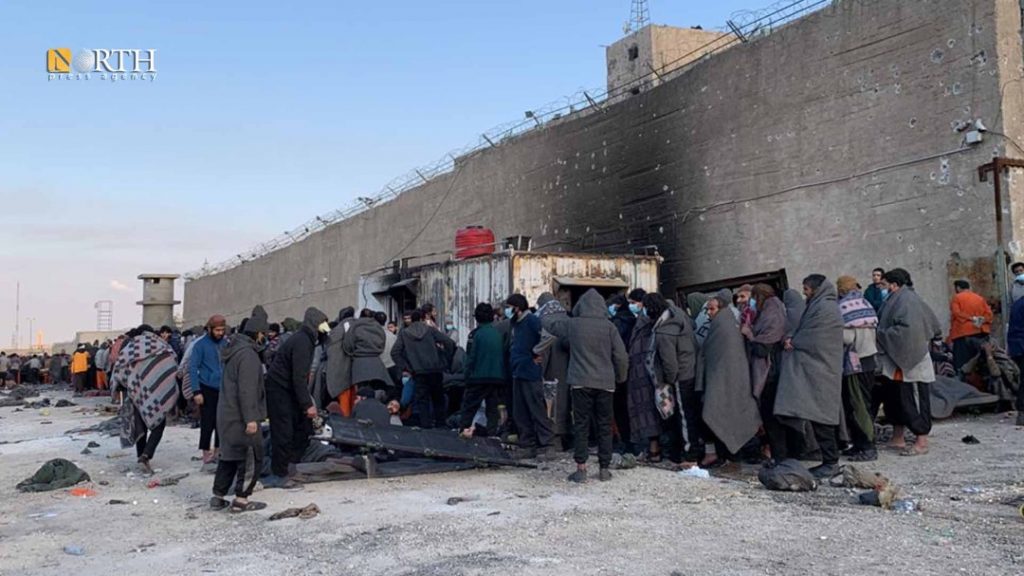UN concern about ISIS attack on Hasakah prison in Syria
QAMISHLI, Syria (North Press) – Head of the United Nations Office of Counter-Terrorism, Vladimir Voronkov, expressed grave concern about the recent attack in Hasakah prison, northeast Syria, by the Islamic State Organization (ISIS) members, on January 20.
“We need consistent, coordinated and comprehensive efforts across countries, sectors and disciplines, anchored in human rights and the rule of law, to address terrorism in all its forms and manifestations,” Under-Secretary-General Vladimir Voronkov briefed.
Voronkov made his speech in a late-breaking meeting called by the Russian Federation with the participation of representatives of 20 nations who gathered in the UN Security Council’s Chamber for an update on recent events in Syria’s northeast, Thursday.
The attack resulted in the escape of an unknown number of ISIS prisoners from a prison said to be holding about 3,000 ISIS members, according to the United Nations.
UNICEF estimates that the prison also housed more than 700 children.
Voronkov expressed his shock at reports saying ISIS used these children [Cubs of Caliphate] as human shields.
Reports now indicate that some children remain trapped in the area, and some 45,000 people have been displaced, with many running to seek shelter in the Syrian government-held areas.
In 2020, the Under-Secretary-General, during a briefing to the UN Security Council, warned about the urgency of leading the children in these camps out of harm’s way,
Speaking yesterday evening before Security Council member states, the endorsed UNICEF Executive Director Henrietta Fore’s call that these children should not have been detained militarily in the first place.
In a statement released, Wednesday, by Henrietta H. Fore, Executive Director of UNICEF, said all parties to the conflict in Syria should bear responsibilities to spare civilians and those who do not carry arms, and they should give priority to safety of all the children inside the Guweiran prison.
“The children stranded inside the prison might be enforced to do an active role in the ongoing clashes between ISIS detainees and the security forces,” Fore said.
The Syrian Democratic Forces (SDF) stressed that they were obliged to detain these children [cubs of caliphate] as a necessary temporary option in order to preserve their safety and the safety of society from them at the same time, and these are temporary measures until appropriate solutions are found to deal with this issue.
The SDF indicated in a statement yesterday that its forces dealt with children as victims in the first place.
The SDF added that the major obstacle impedes the advance of the SDF forces is that the terrorists are using Cubs of the Caliphate as human shields.
The SDF stressed its commitment to all conventions and treaties related to the protection of the children.
According to the Under-Secretary-General, “this incident was predictable; ISIS has been highlighting and calling for jail breaks.” There have been similar previous cases in Syria and elsewhere in the world.
ISIS and al-Qaida Sanctions Monitoring Team warns of the precarious holding arrangements in the northeast Syria, saying this incident was predictable.
Voronkov indicated that ISIS’s ability to strategically exploit prison penetration in this region may be limited. “The organization cannot easily accommodate the fugitives or expel them in large numbers.”
“Therefore, it is not surprising that many of those who escaped from prison were killed or re-arrested. But this does not mean that the threat can be neglected,” he said.
As for the Special Envoy of the Secretary-General for Syria Geir Pedersen, he said that the ISIS attack was a clear message to all necessitating the need to unite to combat the threat of internationally designated terrorist groups, and to solve the problem of a broader conflict in which terrorism inevitably flourishes.
The Under-Secretary-General urged the Council to address dire conditions Hawl, Roj and other detention centers in Syria’s northeast.
Over 56,000 people are being held in Hawl alone, most of them women and children. The prison attack, alongside another launched 11 hours later in Iraq that killed 11 soldiers, highlight two pressing concerns, the attacks are not isolated incidents; and civilians pay the highest price for the degraded security situation, according to Voronkov.

